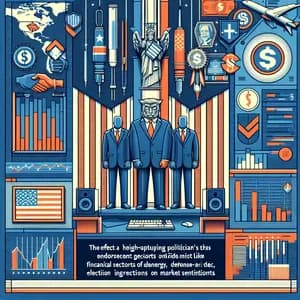Tariff Turbulence: How New Trade Policies Are Shaking Up the Stock Market

The Impact of New Tariffs on the Stock Market: A Closer Look
As the financial landscape continues to shift, recent developments surrounding new tariffs have sent ripples through the stock market, causing significant volatility among blue-chip stocks. On August 7, the Dow Jones Industrial Average experienced a notable decline, losing around 224 points, primarily driven by a downturn in key companies such as Caterpillar Inc. ($CAT). This decline highlights the interconnectedness of trade policies and stock performance, making it crucial for investors to stay informed about the implications of such changes.
Caterpillar Inc. ($CAT), a global leader in construction equipment, has been a focal point during this tariff discussion. As tariffs on imported goods increase, the costs for manufacturers like Caterpillar could rise, potentially impacting their profit margins and stock performance. Investors should monitor how these tariffs affect the company's pricing strategies and market competitiveness.
Similarly, companies in the technology sector, such as Intel Corporation ($INTC), may also feel the pressure. Intel, which relies on a diverse supply chain for its semiconductor manufacturing, could face increased costs due to tariffs on imported components. The semiconductor industry is particularly sensitive to trade policies, and any disruptions could influence stock prices and investor confidence.
In contrast, some companies might benefit from these tariff changes. For instance, Palantir Technologies Inc. ($PLTR), known for its data analytics and software services, may see an uptick in demand as businesses look for optimization strategies amidst rising costs. Companies often turn to data analytics to improve efficiency and reduce expenses, making Palantir’s services increasingly valuable in a turbulent market environment.
Moreover, Apple Inc. ($AAPL), a company heavily reliant on a global supply chain, is another key player to watch. Apple has faced scrutiny over its manufacturing processes, and any tariff increases could lead to higher prices for consumers or squeezed margins for the company. Investors should closely observe how Apple manages these challenges, as its stock is highly sensitive to changes in trade regulations and consumer demand.
Finally, the recent developments also raise questions about how financial institutions like JPMorgan Chase & Co. ($JPM) will navigate this new landscape. As banks assess the creditworthiness of companies affected by tariffs, there could be shifts in lending practices or investment strategies that impact the broader market. JPMorgan, under the leadership of CEO Jamie Dimon, is known for its proactive approaches to market changes, making it a key player to consider.
In summary, the introduction of new tariffs is reshaping the stock market, creating both challenges and opportunities. Investors should stay vigilant and consider the implications for companies like Caterpillar Inc. ($CAT), Intel Corporation ($INTC), Palantir Technologies Inc. ($PLTR), Apple Inc. ($AAPL), and JPMorgan Chase & Co. ($JPM) as they navigate these turbulent waters.
For further insights and a detailed analysis of the market's response to new tariffs, please refer to the original news articles:




